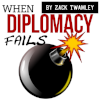We often hear about certain acts or crimes violating the Hague Convention, but what does this mean? The Hague in Holland, Netherlands, was a city of great judicial importance to the Dutch Kingdom of the Netherlands. It had hosted the States General in the past, and to this day hosts the International Court of Justice for trying international war criminals. Yet the ICJ was in many ways pre-empted by the Hague Conventions, a set of agreements outlined and agreed to over the course of two conventions in 1899 and 1907, with a third planned for 1914 or 15. In the case of the third convention, unfortunate unforeseen events managed to block its taking place. But what about the other two conventions, what did they actually aim to achieve? And what can they teach us about the outbreak of the First World War?
The First and Second Hague Conferences took place in 1899 and 1907 respectively, and were meant to define and usher in a new era of peaceful relations between European and world nations. At the very least, they were supposed to formalise and normalise certain actions, such as declaring war, and safeguard against certain excesses, like war crimes.
The First Hague Convention in 1899
The first conference is mostly remembered for its Russian association. This is because it was pushed for by Russian Foreign Minister Mikhail Muraviev, a member of the Far East faction in the Russian court, and a primary reason for why Russian foreign policy became more concerned with events in Asia, then Japan, and then the Russo-Japanese War. Muraviev would die shortly after the conference opened.
One of the articles put forward stipulated that for a period of five years, in any war between signatory powers, no projectiles or explosives would be launched from balloons, "or by other new methods of a similar nature." The declaration was ratified by all the major powers mentioned above, except the United Kingdom and the United States. A similar ruling on the use of poisonous gases in wartime was accepted by all...except the United States.
The Second Convention in 1907.
8 years later in 1907, with international relations greatly challenged and changed by the events of the Russo-Japanese War, the interested powers tried again. Originally, Theodore Roosevelt had requested the conference begin earlier, but the aforementioned conflict in Asia prevented everyone getting together until this date.
Perhaps the most interesting article in the second conference concerned the 'Convention Relative to the Opening of Hostilities', wherein in article three it stated that
"The existence of a state of war must be notified to the neutral Powers without delay, and shall not take effect in regard to them until after the receipt of a notification, which may, however, be given by telegraph. Neutral Powers, nevertheless, cannot rely on the absence of notification if it is clearly established that they were in fact aware of the existence of a state of war."
The terms of such an article give credence to the idea that German Chancellor Bethmann Holwegg believed he had to declare war on Russia BEFORE hostilities could begin. There is thus legs in the argument that Holwegg was merely acting according to the provisions of the Hague Convention when he approved of Germany's declaration of war on Russia on 1st August 1914. Whereas outsiders of the German court and several historians since have been able to see that declaration as proof of German culpability in the pursuit of European domination in the outbreak of the war, contemporaries in the German government believed Russia had given German no choice, as St Petersburg had been mobilising for an entire week beforehand - an act fundamental to the exercise of war, even if mobilisation itself was not quite a declaration of war. By avoiding giving the declaration of war, Russian Foreign Minister Sergei Sazonov essentially played the victim, and succeeded in pulling the wool over the eyes of many historians that were to come. Considering this evidence, I would be content to argue that Germany declared war out of this 'misguided sense of legal propriety' rather than out of a distinct malice. If malice had been present, the declaration would surely have come a week or even a fortnight earlier.
Ironically then, we could argue that the very stipulations of the Hague Conventions forced Germany to make war; in short, we could argue that the Hague Convention, a convention designed at ensuring peace or at least the maintenance of peaceable relations - made war more likely in the tangled mess of events which constituted the July Crisis in 1914. Without the Hague Convention, Holwegg may well have responded in kind to Russia's provocative and warlike moves without a declaration of war - this may well have added to the considerable confusion present in the West, where neither London, Brussels, Rome, Paris and to some extent Vienna truly knew what was going down. In murkier circumstances, it is possible that the actual label of 'aggressor' may well have been harder to attach to a single power, as, in my mind, it should be.
In a further act of irony, it was because of the First World War that the suspected third Hague conference did not take place. Much like Hitler's Nuremberg Rally for Peace planned for 1939, a great deal of this irony is lost in the tragedy today.






